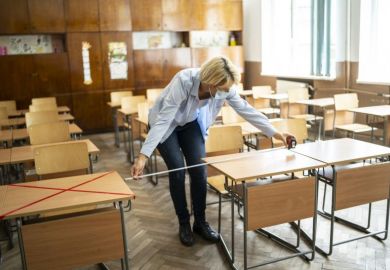Scientists said universities should continue to insist on the wearing of face coverings in classes while coronavirus case numbers in the UK remain high, as a Times Higher Education survey reveals varying requirements across institutions.
The majority of the 65 institutions that responded said that they were “encouraging” or “requesting” that students and staff wear masks on campus in the autumn term. Many said that this would apply mainly when walking around campus, but some said that they should be worn in classrooms, too.
Institutions in London were noticeably more strict about mask-wearing, reflecting the continued prevalence of coronavirus but also the diversity of their student bodies.
London Metropolitan University said that its decision to make face coverings mandatory for staff and students moving around buildings reflected its significant number of black, Asian and ethnic minority students, “groups that have been disproportionately affected by the Covid pandemic”.
UCL said it expected face coverings to be worn everywhere on campus. “This includes all staff, students and visitors in offices, labs and teaching spaces or other indoor areas, unless you are alone in a room,” the university said.
The London School of Economics said staff and students “will be strongly encouraged to wear masks in LSE buildings”, but added that it may introduce further protocols.
The University of East London said it was asking students to commit to wearing a mask in enclosed and crowded spaces, and Imperial College London expects staff and students to wear masks in indoor settings when working “within two metres” of one another.
Three other institutions outside the capital – Bolton, Glasgow and Birmingham City universities – said masks would be mandatory on campus. However, Glasgow and Birmingham City specified that this only applied when moving around campus, not when seated.
Stephen Reicher, Bishop Wardlaw professor of social psychology at the University of St Andrews and a member of the Westminster government’s Scientific Advisory Group for Emergencies (Sage), said it was “a little odd to have masks when moving around campus but not in classes”.
A number of factors impacted the likelihood of transmission – distance, ventilation, duration and projection – and the value of masks depended on the state of those other factors, he said. “Lectures are generally quite crowded, indoors, long lasting and noisy. In that context, masks are one of the few remaining protections.”
Professor Reicher noted that Covid case numbers are currently 20 times higher than this time last year and that many students won’t be fully vaccinated at the start of term. “I think it would be prudent to retain masks in classes until we meet certain thresholds in terms of prevalence and proportion of people who are vaccinated,” he said.
“All in all, you can’t separate things out. Undoubtedly masks are a part of our armoury against Covid. And they remain critical until we improve in those other areas.”
Susan Michie, professor of health psychology at UCL and a member of Sage, said that the “evidence has become increasingly clear that wearing appropriate face masks in indoor spaces helps to reduce transmission”.
“However, this should be alongside ensuring that all indoor spaces inhabited by university students and staff should be adequately ventilated and, if this is not possible, be equipped with an adequate air-filtration system,” she said.
POSTSCRIPT:
Print headline: Wear masks on campus and in classes, scientists urge
Register to continue
Why register?
- Registration is free and only takes a moment
- Once registered, you can read 3 articles a month
- Sign up for our newsletter
Subscribe
Or subscribe for unlimited access to:
- Unlimited access to news, views, insights & reviews
- Digital editions
- Digital access to THE’s university and college rankings analysis
Already registered or a current subscriber?








